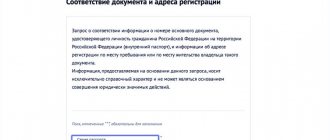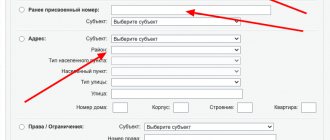All possible cases of a ban on travel abroad are described and enshrined in Article 15 of Federal Law-114 “On the procedure for leaving the Russian Federation and entering the Russian Federation.”
In accordance with this law, in cases of imposing a temporary restriction on the right to leave the Russian Federation, a citizen is given a notice indicating:
- the basis and duration of the restriction;
- date and registration number of the decision on the restriction;
- information about the organization that has accepted responsibility for limiting this right.
Such notifications are issued by: the federal executive body in the field of internal affairs (Ministry of Internal Affairs of the Russian Federation) or its territorial body.
When a ban is issued, information about the debtor is transmitted to the border guards' database electronically, and the citizen's foreign passport is transferred to the passport office, where it will be stored until the approved period expires.
Why is it prohibited to travel?
One of the most common reasons for a ban on leaving the country is numerous debts. The second after that is problems with documents. These could be errors when issuing tickets, expired passports, or lack of a visa. Travel is also prohibited if you use fake documents or enter erroneous data. There may be other reasons for refusal to travel abroad:
- if a citizen has access to state secrets, he serves in the FSB or the prosecutor's office;
- if a citizen is undergoing compulsory or alternative service;
- if there is a restriction on traveling abroad by a court decision;
- if one of the parents is against his child crossing the border;
- when a person is suspected or accused of committing a crime.
At the same time, it is possible to move within the country, including to Crimea. But this doesn't mean you should continue accumulating debt.
Why is travel abroad closed?
In Russia, restrictions on traveling abroad are imposed by a bailiff. Here are the cases in which he has the right to do this:
- if there are debts for alimony, compensation for property damage, moral damage and harm to health in the amount of 10,000 rubles;
- if there are debts on taxes, loans, traffic police fines, utilities or other government claims in the amount of 30,000 rubles. If you are two months overdue on the voluntary repayment date indicated by the bailiff, then a debt of 10,000 rubles is sufficient for a travel ban;
- if requirements of a non-property nature are not fulfilled on time, for example, those relating to communication with a child after the parents’ divorce.
This is stated in Article 67 of Federal Law No. 229-F3 “On Enforcement Proceedings” and applies to individuals and individual entrepreneurs .
Debts add up. If you have several small debts, but the total amount is more than 30,000 rubles, then the bailiff has the right to impose a travel ban by decision of the plenum of the Supreme Court of the Russian Federation No. 50.
What debts will lead to a ban?
Not all types of debt lead to a ban on a citizen’s departure to another country. The reason for stopping at the border will be a court decision, which is sent to the border service.
List of the most common types of debt for which you may be prohibited from traveling abroad:
- Unpaid taxes in a total amount of 30 thousand rubles. The reason for the ban is debts to pay taxes in business, land, and real estate.
- Debts for utility bills for a period of 3 months or more. They can be found on receipts or when contacting the housing office. If you have accumulated a large unpaid amount and are in litigation with the housing office, you may be prohibited from leaving Russia. Or the homeowner may be faced with a situation where he rents out living space to unscrupulous tenants and is not aware of the existence of accumulated debts.
- Loan debts. Non-payment for more than six months is a good reason for issuing a travel ban. But only a period of arrears of 6-7 months is not enough. In any case, the creditor must go to court and receive a decision, which will include a clause prohibiting the debtor from leaving the country. Also, a restriction on travel can be obtained if the accumulated amount of debt is more than 30 thousand rubles when proceedings have begun in court, when a temporary restriction on the movement of the borrower has been issued.
- Fines from the traffic police, as well as administrative fines from the labor inspectorate or police. Their presence will also cause difficulties when crossing the border.
- Non-payment of alimony. Although this violation has ceased to be a criminal matter, having a debt of 10 thousand rubles remains an obstacle to leaving Russia.
The presence of all these fines and debts can be checked in several ways. When the information is in hand, it is much easier to avoid negative consequences - correct the situation in a timely manner and calmly leave the country.
Where to get information about border crossings
If this information is so useful, then a natural question arises: “Where can I get this information?” Like any information about a person, information about crossing the state border is collected and stored in a special database, to which various law enforcement agencies have access.
There are two ways to obtain an extract about a specific person crossing the Russian border:
- official request , which indicates a compelling reason for providing data (the person is wanted, is evading taxes or is suspected of understating his income). Such requests should be sent by investigative committees, tax inspectors, and lawyers within the framework of a court hearing;
- find a customs officer who will bypass the procedure and provide the necessary information. But this service is not free.
There is another way to obtain information about a Russian citizen crossing the border of the Russian Federation. This is to contact our detective agency.
We will provide information not only about the place and duration of a person’s stay abroad, but also about whether he went there alone or in company with the opposite sex.
Ban process
If you fail to make payments on your obligations for any period, you may be sued. In this case, the judge makes a decision and fills out a writ of execution. The paper is transferred to the FSSP. The bailiff service opens enforcement proceedings and takes measures to collect the debt.
If the debts are more than 10,000 rubles, the bailiff may impose a restriction on the debtor from leaving Russia. But this is not always done and such measures are not applied to all citizens. Therefore, some may be lucky and calmly cross the border even with a debt amount of 0.5 million rubles. Others are less fortunate and are subject to a ban even with an amount of 10,010 rubles or more.
The standard duration of the ban is 6 months. After this, the restriction is automatically lifted. But, if the debt is not repaid by this date, the ban may be extended. The travel ban document is usually sent by mail. But the letter may get lost or not reach the addressee, especially if he is registered at one address, but actually lives at another. Therefore, it is important to check the debts yourself. Perhaps, starting from 2021, mandatory personal notification of debts and travel bans will be introduced via SMS notification to a mobile phone.
Who has the right to monitor compliance with quarantine and self-isolation regimes?
The main body leading the fight against the pandemic in Russia was Rospotrebnadzor.
The procedure for monitoring citizens' compliance with quarantine is established in each individual region independently. In addition, what exactly each person with coronavirus should do depends greatly on the policy of the anti-coronavirus headquarters of the clinic to which he is assigned, and many other factors. The regional Rospotrebnadzor also has a great influence in how citizens monitor compliance with isolation.
In general, it is not an exaggeration to say that there is no generally accepted, understandable and structured system for tracking coronavirus patients and contactees in Russia - Rospotrebnadzor has not developed a generally mandatory procedure.
As a rule, if a person receives a positive PCR test for coronavirus, information about him is sent to the regional Rospotrebnadzor. From there, the citizen is required to call, inquire about his condition, inform about the need to comply with quarantine, monitor the condition of the body and, if necessary, call a doctor.
Then Rospotrebnadzor transmits information about the patient to the district clinic, from where a doctor comes to the patient, takes a coronavirus test and monitors his condition. Later, in a few days, a specialist will come to the person from there to take the test again. For the period of quarantine, the clinic issues sick leave to the citizen.
In addition to face-to-face monitoring, employees of the clinic or Rospotrebnadzor have the right to call the patient to make sure that he is at home and his condition is stable. There are cases when police officers made rounds to the addresses of patients and monitored their compliance with the isolation regime.
In some regions, special mobile applications have been developed and implemented to track a person’s location. Information from the application goes to regulatory authorities, in particular, Rospotrebnadzor.
Thus, it is difficult to formulate a clear list of organs that track the persons in the picture. These include Rospotrebnadzor, clinics, and even the police.
In practice, citizens’ reviews of how Rospotrebnadzor checks self-isolation at home are unflattering. It is not uncommon for Rospotrebnadzor and clinic specialists to contradict each other regarding the start and end of quarantine and the order in which they track patients: mobile applications record violations that did not occur.
All this confusion leads to the fact that a person sits on sick leave longer than he should and receives unreasonable fines.
How to check for debts
The debtor is notified of the existence of a debt and a travel ban by means of a letter. But often citizens do not receive them due to the fact that they do not live at their permanent registration address or are even located and work in another region. Therefore, if there are doubts about the presence of any penalties, it is better to check them yourself. You can do this in several ways:
- On the government services portal . If you did not have an account before, register and log into your personal account. On the website, fill out a special application for information. If it turns out that you have debts, you can pay them directly through the government services portal.
- On the Federal Tax Service website . On the Tax Service page you can check for any tax debts. To do this, enter your TIN, full name or check your personal account.
- In the FSSP. To check information on debts, it is not necessary to register on the site. On the search page, indicate the territorial branch. After that, enter your year of birth and full name. A page will open with information about all the proceedings opened by bailiffs for your name. If you have debts, you can close them here.
In addition to the listed methods, you can get a full check on the website nevylet.rf or other similar paid services. But for this service you will have to pay about 300 or 500 rubles.
How to check your passport for a ban on entry into Russia online
A service for checking the presence of restrictions for foreigners wishing to enter Russian territory has been launched on the basis of the website services.fms.gov.ru. Lists with the names of violators are updated daily with information from the FMS. Data on violators from the FSB, Rospotrebnadzor, and the Drug Control Agency are not sent to the site.
You are prompted to enter data in several fields. Sections marked with an asterisk are required.
To increase the accuracy of the information and speed up the processing time of the request, it is better to enter data in all cells:
You may also like
1
Finding suitable work with temporary residence permits in the Russian Federation
3 141
- The first two cells are filled in Latin font, the rest - in Russian;
- Date format – day, month, year;
- When entering an identification document, you are asked to select a civil or foreign passport;
- At the end of the page, a numeric code is entered into a special field;
- Only after this the “Send request” button is pressed.
The test result can be viewed immediately. If the service shows that there is a refusal of entry, then with a 90% probability you will not be able to cross the border. The number of requests per day is not limited.
The information received does not guarantee 100% accuracy to a foreign citizen and is for reference only. For legally reliable information, you should contact the migration department of the Ministry of Internal Affairs in person or send a request by mail.
Is it possible to bypass the ban?
It is difficult to appeal a refusal on your own. You must be a specialist in the field of migration law. If you enlist the help of a lawyer and file a claim with the court or with the head of the Main Directorate of the Main Directorate for Migration Issues of the Main Directorate of Migration Affairs of the Ministry of Internal Affairs, then within one to two months the ban can be revised.
Firms offering the service of removing restrictions within a few days use fraudulent schemes. Persons seeking their help risk losing money or having their ban extended.
The ban on foreigners entering Russia is a temporary measure. If there are circumstances (close relatives in the Russian Federation, serious illnesses requiring highly qualified assistance), the decision is subject to appeal in court. Sometimes the Russian sanitary service introduces temporary restrictions for entire countries. This is due to epidemics and terrorist threats from representatives of these states.
Checking debts to creditors
Debts for bank loans can be checked in your personal account in the Internet bank or mobile application. When logging into your personal account, you can view your credit history in a particular bank and find all the information on unpaid fees. But this is the case if you control all your loans and probably know that there are no loans obtained illegally using your passport.
If you are not sure, for example, you recently lost your passport and made a new one or transferred personal data to strangers, then it is better to request your entire credit history. It is stored in several credit history bureaus at the same time. You can request this document yourself for free twice a year or for money through special services. In the second case, information can be obtained faster than if you deal with the issue yourself. Therefore, if time is short, it is better to choose the second option.
Election procedure
As soon as the investigator comes to the conclusion that it is advisable to apply a recognizance not to leave the place of residence to a particular person, he issues a resolution on this, which he files in the case file. Then a form is filled out, where the signature of the accused or suspect is required, such a document is also filed in the materials:
WARNING NOT TO GO AND PROPER CONDUCT (sample)
Ekaterinburg October 20, 2018
Y. Ivanov Ivan Ivanovich, born March 3, 1977, living at the address: Ekaterinburg, st. Ryabinina, 2, apt. 89, I give this signature to the investigator of the second department for the investigation of cases related to violations of the operation of transport, Lieutenant of Justice Morozov E.N. is that until the end of the preliminary investigation and trial in a criminal case accusing me of committing a crime under Part 3 of Art. 264 of the Criminal Code of the Russian Federation, I undertake not to travel outside the city of Yekaterinburg, not to change my permanent place of residence and registration on the street. Ryabinina, 2, apt. 89, Yekaterinburg, without the permission of the investigator or the court, to appear when summoned, and not to interfere with the proceedings in the above-mentioned criminal case.
I, Ivan Ivanovich Ivanov, was explained the responsibility for violating the undertaking not to leave the place and proper behavior in the form of a change to another preventive measure, including house arrest or detention.
Accused: Ivanov I.I., number, signature
The subscription was selected by the investigator of the second department for investigating cases related to violations of the operation of transport, Lieutenant of Justice Morozov E.N. – number, signature
A mandatory item in the subscription must be the validity period for the suspect or accused.
Typically, investigators indicate, as in our example, “until the end of the inquiry (preliminary investigation) and trial.” This means that throughout the entire investigation, during the period of examination of the case by the prosecutor (after drawing up the indictment or conclusion), as well as throughout the entire trial (no matter how long it lasts, taking into account the postponement of hearings), a person’s freedom of movement will be limited.
The chosen preventive measure will last until the court announces a verdict or decision based on the results of the consideration of the criminal case. The operative part of the judicial act must necessarily indicate the decision regarding the subscription. There may be three options:
- “…. the preventive measure in the form of a written undertaking not to leave the place and proper behavior, chosen for the convicted V.K. Petrov, shall be left until the entry into force of this sentence.” Such an order will take place when Petrov V.K. imposed a punishment not related to imprisonment - for example, probation, correctional labor, a fine, etc.
- “...the preventive measure chosen for A.V. Kovalev should be cancelled.” Absolute cancellation of the subscription will take place subject to the complete acquittal of the citizen or the cessation of prosecution against him on any of the grounds (under an amnesty, due to the expiration of the statute of limitations for prosecution, in connection with reconciliation, etc.).
- “….. elected Manshina V.S. change the recognizance not to leave the place to detention until the verdict enters into legal force.” In this case, the court sentenced Manshin, who was under signature, to imprisonment; in this regard, he will be immediately taken in handcuffs to the court's guard room, and then taken to a pre-trial detention center.
In the above situations, the court, in accordance with the Code of Criminal Procedure of the Russian Federation, exercises its powers depending on the final decision in the case.
Question: Is it possible to change the preventive measure before the verdict is announced?
Yes, if the person violates it.
What to do to remove restrictions
If you find yourself in debt and leaving the country is restricted for you, pay all debts in full. Details for the calculation are posted on the service websites. You can pay the debt via Internet banking or via bank transfer. If you were aware of the debt and ignored several warnings about the terms, most likely you were assessed fines and penalties on the principal debt. Pay this amount too.
As soon as you have fully repaid the debt, notify the bailiffs. To do this, contact the FSSP and present payment receipts to employees. After this, take a certificate of payment of all debts. This is not necessary, but in this case you will have proof that you have paid off all debts.
Now you just have to wait for the travel restrictions to be lifted. This takes quite a long time. Usually at least 2 weeks. If you try to cross the border at this time, you will not be released, even if you have a document confirming the repayment of debts. The ban can be urgently lifted in two cases: if your close relative dies abroad or when you urgently need treatment in another country.
Is there a blacklist?
The definition of “black list,” which frightens many debtors, exists at an unofficial level. The blacklist includes citizens who were unable or unwilling to pay their debt to a financial organization on time. This can only happen once.
But most often, only those debtors who systematically neglect their obligations to the bank are included in the “dreaded” list.
Each financial institution independently sets loan repayment terms. These deadlines cannot be violated. Otherwise, the debtor faces a significant fine. But the imposition of a fine does not mean that the debtor has not joined the blacklist.
Only the bank decides whether or not to include a defaulter on the dreaded list and whether or not to make him “restricted from traveling.” Typically, the register includes those debtors who take out a loan and do not intend to repay it. Such debtors are wanted by the judicial system.
Lists of bank debtors can be:
- private;
- collection;
- BKI lists.
Bailiffs also have their own lists. The bank manager also has a register of defaulters. Typically, a bank specialist promptly warns his clients about the need to repay the loan.
Features of private lists
Such lists are available only to bank employees. It is important to understand that bank employees do not have the right to give out information about defaulters on the register. Disclosure of personal information is a violation of the constitutional rights of a Russian citizen. If the bank agrees to disclose private information, then it will be the defendant in court.
Third parties are also prohibited from accessing private information. Credit history is a purely “internal” matter. Taking into account the credit history, the bank subsequently decides whether to continue to trust the borrower.
If the borrower often violates the banking schedule for no valid reason, then he will be denied a subsequent loan.
Features of bailiff lists
The natural solution for a bank faced with an unpaid loan is to go to court. In this case, the database of all debtors is sent to the bailiff service. Every person going abroad can find out whether his name is on the list among other “restricted to travel” on the website of the bailiff service fssprus.ru.
You can find out information regarding the presence of debt and its size based on the fact that it ceases to be private.
Checking debts online on the FSSP website
If the citizen continues to ignore his obligations, the court makes a decision regarding the forced collection of the loan amount. The defaulter also undertakes to pay legal costs. In some cases, the court makes a decision regarding the sale of collateral real estate.
How restrictions are lifted
If you find out about the ban on leaving the country at the airport when the plane ticket has already been paid for, there is nothing you can do. The border guards will not let you cross the border, even if you have already paid all your debts, but for some reason the information from the bailiffs has not yet been received by the border service.
When debts have been paid, the bailiff must verify this. You can speed up this process with a personal appeal. Bailiffs review the case and transmit data to border guards. Sometimes it takes several days for the information to arrive, but generally you will have to wait about 14 days.
If a travel restriction was imposed on you by mistake, and you were unable to cross the border and at the same time lost money for tickets, you can go to court. With a high probability, you will be able to win the case, and you will be compensated for your losses. But it will no longer be possible to return lost time, benefits, or simply pleasant impressions from a joint family vacation. Therefore, even respectable citizens should periodically check the availability of enforcement proceedings in their name, so as not to spoil their vacation or business trip.
How to find out if there is a ban on traveling abroad
There is no database on bans on traveling abroad publicly available on the Internet. Here are two options for checking the ban:
1) Check the status of enforcement proceedings at State Services. The bailiff can impose a travel ban only if there is enforcement proceedings: look at the State Services to see if they are registered with you. If yes, click on the “Get information about the progress of enforcement proceedings from the database” button.
In about a day, you will receive a response from State Services, which will list the actions for your enforcement proceedings, for example, a request to the FMS, a request to the bank, a request to the traffic police, and so on. Look for the line “Resolution on temporary restriction on the debtor’s departure from the Russian Federation (O_IP_ACT_BAN_EXIT)” with the date. If it is not there, then most likely there is no restriction on travel. But since these responses are automatic, they do not provide a 100% guarantee about the presence or absence of a ban.
Here's what else you can do.
2) Find out directly from the bailiff at the place of registration. Going to the bailiff at your registration address and asking if a ban has been imposed is the most effective way to get reliable information. But there were many cases when the bailiff, having checked his database, said: “It’s strange that there is still no ban. We’ll apply it in 20 minutes!” We will not recommend this method.
3) Arrive at the airport with a fully refundable air ticket , register, pass (or fail) border control, then return, cancel registration and return the ticket. The method is exotic, so be sure to read the fare rules down to the smallest print and buy only a ticket that can be returned or exchanged after registration for a full refund.
FAQ
What to do if there are no debts during the check, but travel is restricted?
In this case, check whether you have any other violations on the basis of which a ban may be imposed. Or find out whether information about debt repayment reached the bailiffs. If there are no objective reasons for imposing a ban, go to court. Make copies of tickets and boarding passes that can be attached to the list of evidence.
Can returning to Russia be prohibited?
If debts arose while you were abroad, then you will be allowed into the territory of the Russian Federation. But you will no longer be able to leave until the restriction is lifted.
Will compensation for the limitation be provided through insurance?
A travel ban is not an insured event, so it will not be possible to receive a refund for paid tickets and accommodation through insurance. Therefore, check any possible restrictions in advance.
about the author
Klavdiya Treskova - higher education with qualification “Economist”, with specializations “Economics and Management” and “Computer Technologies” at PSU. She worked in a bank in positions from operator to acting. Head of the Department for servicing private and corporate clients. Every year she successfully passed certifications, education and training in banking services. Total work experience in the bank is more than 15 years. [email protected]
Is this article useful? Not really
Help us find out how much this article helped you. If something is missing or the information is not accurate, please report it below in the comments or write to us by email
Who are our clients?
Naturally, we will not name specific names or names of organizations that turned to us for help. But we will tell you what problems they came to us with without hiding.
So, our clients asked to get information about crossing the border by a Russian citizen in the following cases:
- the person was wanted for a long time , but search efforts on the territory of the Russian Federation did not give the desired result;
- suspicions arose that the person was hiding his income , which allowed him to significantly underestimate tax payments or the amount of child support;
- the employer wants to check whether his subordinate is really sick or whether he provided a “fake” sick leave in order to receive unscheduled leave;
- check whether the spouse really goes on business trips abroad , to which country, how long he was there, whether he went alone or in company.
But there were also more joyful reasons for contacting us:
- searching for your travel companions with whom you agreed to keep in touch, but for some reason this did not work out;
- a fellow traveler forgot some of his belongings on the train and the finder wanted to return it to the owner;
- romantic urges.
If for some reason you need to find out whether a person crossed the border of the Russian Federation or not, how often he does it, where he goes and with whom, then feel free to call us. We will provide all the necessary information as quickly as possible.
Comments: 0
Your comment (question) If you have questions about this article, you can tell us. Our team consists of only experienced experts and specialists with specialized education. We will try to help you in this topic:
Author of the article: Klavdiya Treskova
Consultant, author Popovich Anna
Financial author Olga Pikhotskaya
Punishment for violating recognizance not to leave
Question: Who controls the absence of violations on the part of the accused who has been chosen to sign?
First of all, the investigator or interrogator. At the same time, law enforcement officials do not have the opportunity to check on a daily basis whether the person involved in the case is in the city and has not escaped.
Basically, a violation of subscription is detected when a person is summoned for questioning or to participate in other procedural actions (familiarization with examinations, conducting confrontations, checking testimony on the spot, identification, etc.). If a person does not show up or turns off his phone, then the investigator himself or with the help of operational employees visits the accused at his place of residence and finds out the reasons for the failure to appear. If no valid reasons are established, the investigator takes the following steps:
- Issues decisions to cancel the subscription not to leave or to put a person on the wanted list.
- He applies to the court with a petition to select a preventive measure for the escaped person in the form of detention, which is granted by the judges in almost 99% of cases. Typically, such a petition is submitted to the court after the arrest of the person, who is brought to the courtroom at the appointed time for direct participation. The issue of electing a guard is considered by the court within a few hours from the moment the material is received by the office, in the presence of a prosecutor and a lawyer. In cases where the accused has been put on the international wanted list, the meeting can be held without him, and he can be taken into custody in absentia.
Thus, the investigator independently has the right to cancel the subscription , but only the court can choose detention (as well as house arrest).
In practice, there are cases when law enforcement agencies draw up a petition to change a preventive measure due to a request from victims. For example, when in a criminal case the victim turns to the investigator with a statement about coercion on the part of the offender to give certain testimony (in favor of the perpetrator), about threats, etc.
Example No. 1 . Vasiliev P.R., who was charged for robbery for the first time, was released on bail because he admitted guilt and wrote a confession, had a positive description of his place of residence and had a job. After some time, the victim E.G. Mazurova contacted the investigator. with a statement about threats from Vasiliev. She attached to her appeal a printout of SMS messages, where the robber insists on changing the testimony in order to reclassify the act under Part 1 of Art. 161 of the Criminal Code of the Russian Federation (without violence). The investigator canceled the subscription and petitioned the court to order detention, which was granted. Information received from Mazurova was added to the case materials.
In the above example, the victim made approximately the following statement to the official investigating the case:
To the investigator of the investigative unit for the investigation of crimes against property of the Sverdlovsk region, Major of Justice K.R. Makhonov.
victim Mazurova E.G., living at the address: Ekaterinburg, st. Derevenskaya, 2
in the case against Vasiliev P.L.
STATEMENT
By resolution of September 21, 2018, a criminal case was initiated under paragraph “g” of Part 2 of Art. 161 of the Criminal Code of the Russian Federation in relation to Vasiliev P.L., who committed robbery against me - I was caused bodily harm, a bag with cash in the amount of 6,000 rubles was stolen.
I consider the application to P.L. Vasiliev. the undertaking not to leave is unfounded, since he is threatening me with damage if I do not agree to change my initial testimony and explain that there was no violence. Thus, Vasiliev seeks retraining under Part 1 of Art. 161 of the Criminal Code of the Russian Federation, wants to end the case through reconciliation. At the same time, I categorically do not want to reconcile with him.
Based on the above, guided by Art. Art. 119, 120 Code of Criminal Procedure of the Russian Federation,
ASK:
- Cancel Vasilyeva P.L. a preventive measure in the form of a written undertaking not to leave the place and proper behavior.
- Apply to the court with a petition for election in relation to Vasiliev P.L. detention.
- Notify me in writing at the specified address of the decision made on this petition.
Application: printout of SMS messages on 4 sheets.
Mazurova E.G., number, signature.
Such a petition, like any other, requires a separate ruling no later than 3 days from the date of receipt. Such a decision, in turn, can be appealed under Art. 125 of the Code of Criminal Procedure of the Russian Federation to the court, as well as a resolution on the election of a restrictive measure.
Example No. 2 . In relation to Popov K.G., a man with a criminal record, the investigator considered it possible to choose a subscription. At the same time, the victim Ladnov E.N. appealed the decision to apply such a loyal preventive measure. Ladnov pointed out that Popov’s obligation not to leave the city was clearly disproportionate to the crime he had committed (large-scale fraud). The court upheld the victim's complaint, the investigator had to cancel the chosen measure and go to court to resolve the issue of custody.
How to leave your place of residence while under recognizance not to leave - watch the video for advice from a lawyer.










